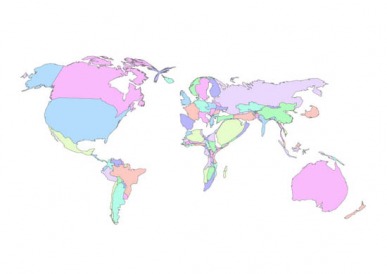|
This fascinating map (source here) highlights how much trouble the human species has feeding itself. If you are unfortunate enough to live in Africa or South Asia, you will struggle to consume sufficient calories to survive. If you are unfortunate enough to live in the United States, Canada, Australia, a handful of European countries, or a Gulf state, you will struggle to consume few enough calories.
Wouldn't it be great if developed economies could just ship off their excess calories and send them to calorie-deficient countries? Hey, don't eat that second donut-- FedEx it to India. We actually do this with clothing. Clothing that is donated to Goodwill or similar stores, but goes unsold, is baled and sold by weight to developing countries. I purchased some of it when I was in Dakar. It provides local consumers with inexpensive, good quality clothing-- but it also puts local textile workers out of business. Food, of course, is yet more complicated. Hungry people don't need your second donut so much as they need the protein- and vitamin-rich lentil veggie stew you SHOULD be eating. Many people who are calorie or vitamin deficient work in agriculture themselves, and they need not only food but a sustainable way to make a living. However, eating less would have the effect of lowering prices-- which would make food more affordable. And eating less junk food would lower demand for empty-calorie crops like sugar and corn, which might free up land for healthier crops. I think the main lesson from this map, however, is to remind those of us in the developed world how lucky we are to have the problems we have. Health care costs exploding because people are overweight and living longer? At least they aren't starving and dying of malaria as toddlers. So we have to push people to go to the gym? The fact that physical work is optional is a sign that we live luxurious lives. If we can't figure out how to keep our population healthy, what chance is there for developing economies, whose challenges are even more daunting?
0 Comments
Home Depot's earnings came in higher than expected today. I was at Home Depot recently. I've noticed that they are one of the few retailers where it is still easy to find a store employee to help you find something. It's nice to see that a retailer can do okay without cutting down to bare-bones staff.
Interesting article in Slate recapping some famous studies done in city subways. My favoritee factoid is that if you ask someone to give up their seat for you, they are more likely to do it if you don't tell them anything about why you want the seat. Here are some subway studies I would like to do:
1. In what cities are subway riders most considerate? New York gets a bad rap, but every time I have been there, someone has offered me their seat on the subway at some point, just because I was carrying bags. 2. How do people deal with escalator-blockers? This one is DC-specific. The Washington DC metro has many escalators in its system, as the public announcements so helpfully point out. Metro etiquette is that people stand on the escalators on the right, allowing those who want to walk up the escalators to pass on the right. It is a serious breach of metro decorum to stand on the left, particularly in rush hour. How such breaches are dealt with varies. Some people just ask the offender to stand on the other side, other people just stomp their feet in frustration or give the offender the evil eye. Asking the person to move nearly always works, so why doesn't everyone do it? Okay, enough subway psychology for today! Had a great time watching The Men Who Stare At Goats this weekend. It is definitely good for a few laughs. I wanted to find out a little bit about how much is actually true in this movie. Wired has a nice short article on the subject here. According to the article, psychic spies and playing Barney to prisoners is true, but nobody actually killed a goat with his mind (the article doesn't say they didn't try, though, and it is also silent on the subject of sparkly eyes). As for how the rumor about killing goats got started, I have my own theory... Spotted this question on Yahoo! Answers (I was looking for examples of non-moral values but that's another story):
What is NOT a function of the Federal Reserve? A. Giving short-term loans to banks B. Controlling the money supply C. Regulating depository institutions D. Lending money to businesses for investment This is an intro to macro classic. If you said D, that was the correct answer. At least until the financial crisis. Some of the recently added facilities look like they could fall into that last category. For example, the Commercial Paper Funding Facility, which buys commercial paper directly from issuers. That sounds a lot like "lending money to businesses..." Time to add E. None of the Above In this clip, Oscar the Grouch's GNN (Grouchy News Network) just isn't grouchy enough, prompting viewers to switch to a "trashier" news show: Pox News.
Obviously the Obama administration is leaning on PBS. You can do your part to show PBS that this is unacceptable: don't buy any products from companies that advertise on their channel. Clearly I need to watch more Sesame Street. Happy 40th! I'm a little late on this one, but the World Economic Forum released its 2009 Financial Development Report in October. The United States, which was #1 in the rankings last year, has slipped to #3 this year, behind the UK and -- surprise!-- Australia.
Australia was #9 last year, but its relatively strong banking sector and economy have boosted it way up the list this year. How much does it matter that Australia is doing well? Australia isn't an extremely large economy. With a GDP of just over $1 trillion (exchange rate basis), it is the 14th largest economy, just after Mexico. That means that stronger demand in Australia has limited ability to help out the world economy. However, it is likely that Australia's economic strength is fueled by China's demand for the resources that Australia exports. And China, a much larger economy, has more scope to boost global demand. |
About Liz
I have worked in economic policy and research in Washington, D.C. and Ghana. My husband and I recently moved to Guyana, where I am working for the Ministry of Finance. I like riding motorcycle, outdoor sports, foreign currencies, capybaras, and having opinions. Archives
December 2016
Categories
All
|



 RSS Feed
RSS Feed
